7 Minimum Viable Product Examples to Inspire You in 2025
7 Minimum Viable Product Examples to Inspire You in 2025
Launching a new product can feel daunting. How do you know if your brilliant idea will actually resonate with users without spending a fortune? The answer lies in a Minimum Viable Product (MVP). An MVP isn't a half-finished product; it's a strategic tool designed to test your core assumptions with the least amount of effort. By focusing on the essential features that solve a primary user problem, you can gather crucial feedback, validate your market, and build a foundation for success.
This article explores seven insightful minimum viable product examples, breaking down their strategies and offering actionable takeaways for your own projects. We'll delve into how these companies prioritised features, learned from early adopters, and iterated their way to success.
Our analysis provides a clear roadmap for your journey from concept to a market-ready application. For developers and entrepreneurs aiming to build high-performance, cross-platform apps, the lessons from these MVPs are invaluable. They demonstrate how a focused approach can lead to products that excel, similar to how modern frameworks like Flutter now lead in performance benchmarks. Each example includes detailed analysis and direct links to help you understand precisely how to apply these proven strategies.
1. Strategyzer
Strategyzer isn't a traditional MVP but rather an educational platform dedicated to teaching the principles behind building successful ones. It provides entrepreneurs, product managers, and corporate innovators with the tools and frameworks needed to de-risk business ideas through systematic testing. The core offering revolves around practitioner-led courses, like 'Mastering Business Testing', that guide users from initial hypothesis to validated learning, ensuring they build products customers actually want.
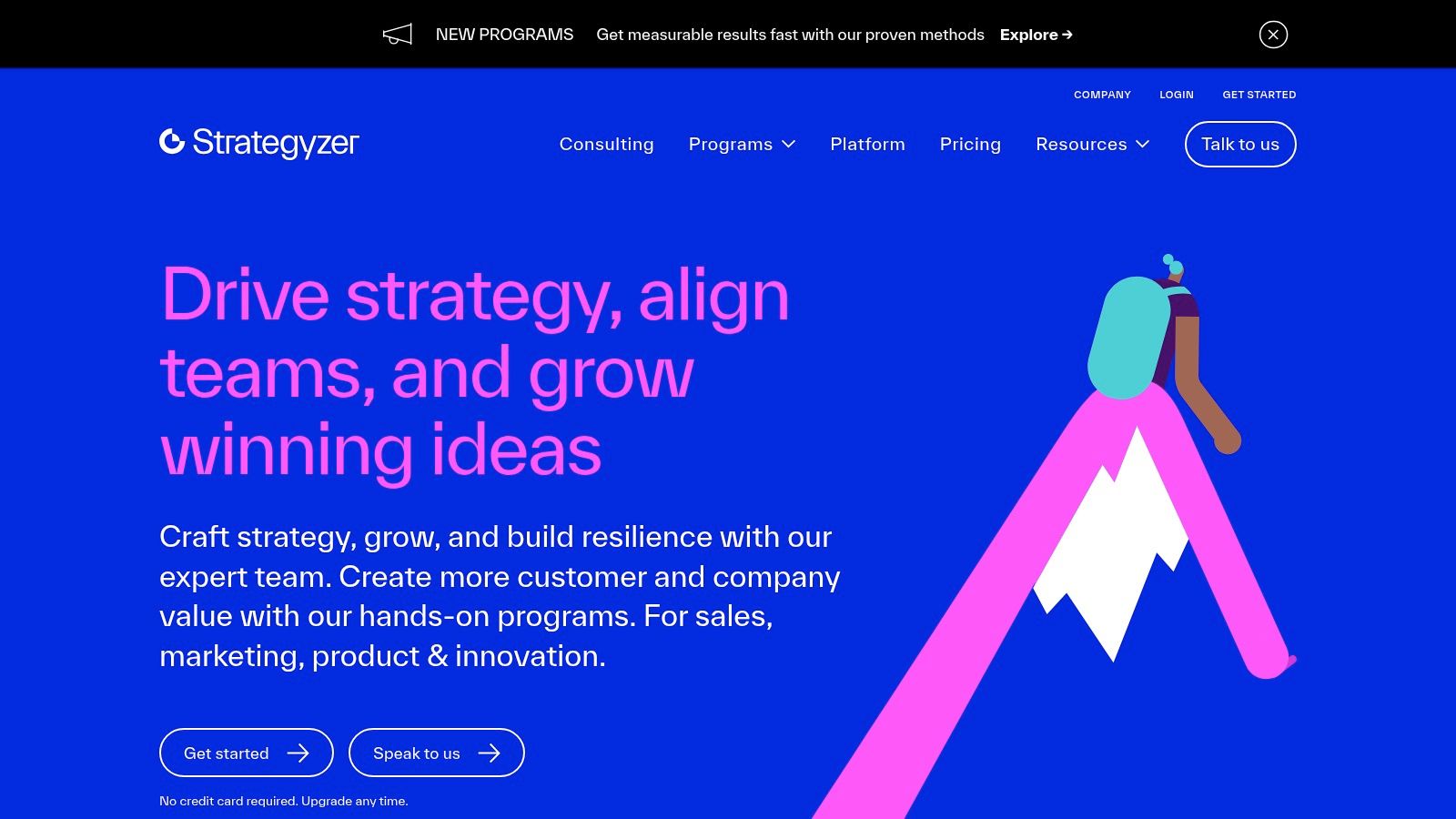
The platform champions a structured approach to innovation, moving beyond theory to offer tangible, reusable experiment patterns and canvases. This focus on practical application makes it a standout resource. Instead of just reading about minimum viable product examples, users learn how to design and execute their own effective tests. This methodology aligns perfectly with modern development frameworks; for more information, you can explore the fundamentals of the agile development methodology.
Key Offerings and User Experience
Strategyzer’s content is grounded in real-world case studies from global companies. The user experience is clean and professional, with self-paced video lessons, downloadable templates, and practical exercises that reinforce learning.
- Core Features: An extensive library of structured experiments, the iconic Business Model and Value Proposition Canvases, and video-based instruction.
- Unique Selling Point: Its laser focus on evidence-based entrepreneurship, teaching teams how to gather data and pivot before committing significant resources.
- Pricing and Access: Courses are priced at a premium level, for example, the 'Mastering Business Testing' course is listed at $499. Access to their proprietary software is often bundled with specific course packages or requires a separate, more expensive subscription.
Strategic Takeaways
Strategyzer's success provides a powerful lesson: an MVP can be an educational product that solves the core problem of how to innovate effectively. By focusing on a high-value, niche skill, they have built a trusted brand.
Pros:
- Content is led by renowned practitioners and grounded in real-world application.
- Provides clear, actionable playbooks for de-risking new ideas.
- Focuses on gathering evidence quickly to validate or invalidate hypotheses.
Cons:
- Premium pricing may be a barrier for early-stage startups or individuals.
- Full software access is tied to more expensive bundles or corporate packages.
2. LEANSTACK / LEANFoundry
LEANSTACK, along with its accelerator platform LEANFoundry, offers a set of practical tools and structured playbooks designed to guide entrepreneurs from a rough idea to a business with paying customers. It operationalises the principles of the Lean Startup methodology, providing a clear, step-by-step process for validating business ideas. The platform’s core is built around powerful frameworks like the Lean Canvas and the Traction Roadmap, which help founders systematically de-risk their ventures.
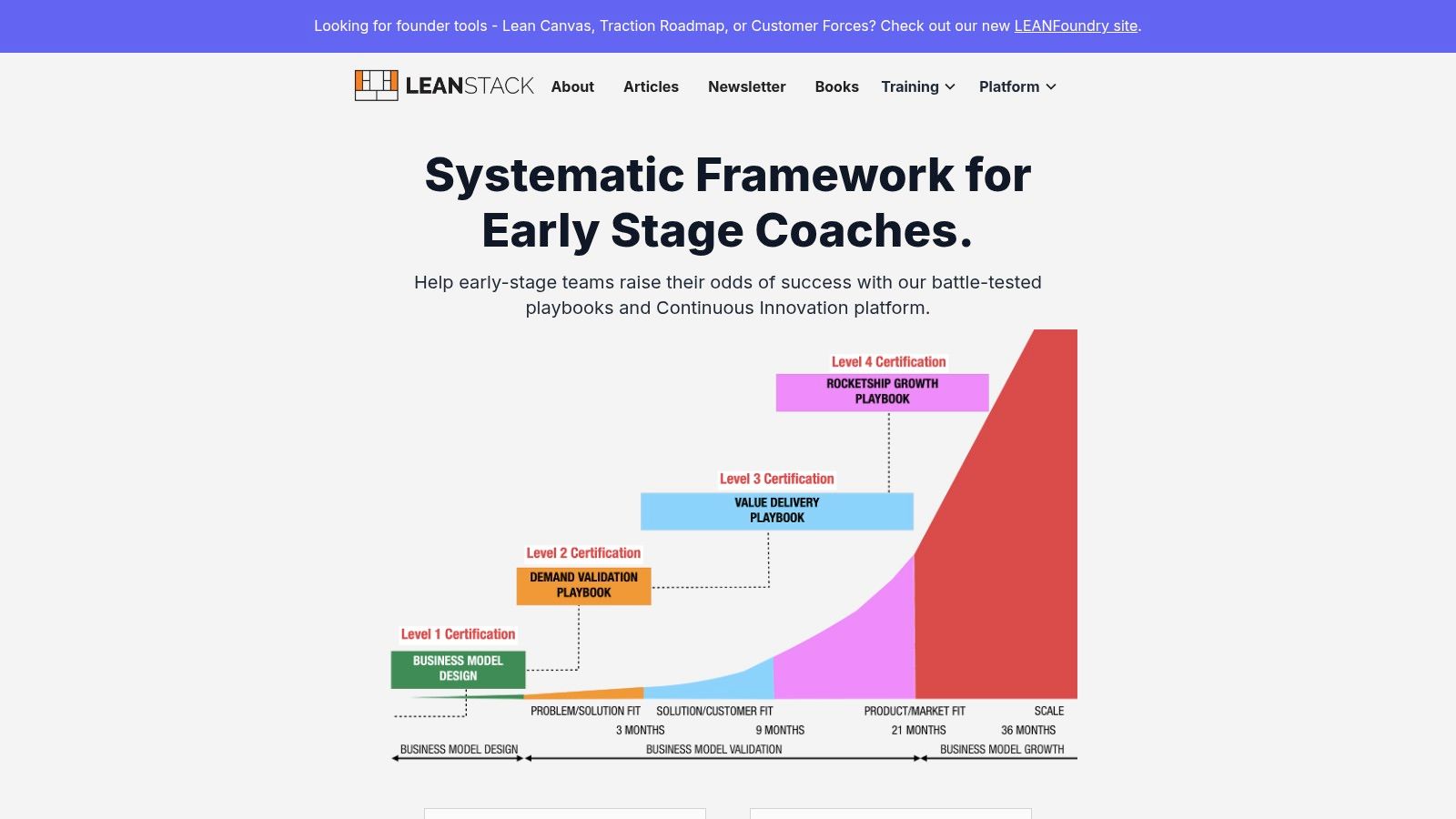
The platform is less about theory and more about doing; it provides guided curricula that are rich with real-world examples and patterns. Instead of just learning about minimum viable product examples, users are equipped with templates to define, build, and validate their own. This hands-on approach is invaluable for founders navigating the early stages of product development. For those building technology products, understanding these fundamentals is a key part of the journey; you can discover more about the essentials of developing mobile apps.
Key Offerings and User Experience
LEANSTACK provides a highly interactive and task-oriented user experience, centred on completing specific validation "playbooks." The interface guides teams through creating canvases, identifying risks, and designing experiments to test core assumptions before writing a single line of code.
- Core Features: Founder tools like the Lean Canvas and Customer Forces Canvas, guided validation playbooks, and team collaboration features.
- Unique Selling Point: Its singular focus on a 90-day cycle to achieve problem/solution fit, providing a tangible and time-boxed goal for early-stage ventures.
- Pricing and Access: LEANSTACK offers a free tier with basic access to the Lean Canvas. Paid plans start at $25/month (billed annually) for individuals, with team and accelerator plans offering more advanced features and collaboration tools.
Strategic Takeaways
LEANSTACK demonstrates that an MVP can be a structured process-as-a-service. It solves the critical founder problem of "what do I do next?" by providing a prescriptive, actionable framework that prioritises learning and validation over premature building.
Pros:
- Extremely hands-on, learn-by-doing approach to business model validation.
- A rich library of case studies and pattern-based guidance.
- Scalable options for individuals, teams, and large-scale accelerators.
Cons:
- The distinction between LEANSTACK and LEANFoundry can be confusing for new users.
- Advanced coaching and collaboration tools are locked behind higher-priced tiers.
3. O’Reilly Learning
O’Reilly Learning offers a vast subscription-based library for tech and business professionals, functioning as an educational ecosystem rather than a single product. It provides on-demand access to an extensive collection of books, expert-led live events, interactive tutorials, and video courses. For those studying minimum viable product examples, the platform is an invaluable resource, featuring content from over 200 respected publishers, including Strategyzer’s foundational texts on lean experimentation and business model generation.
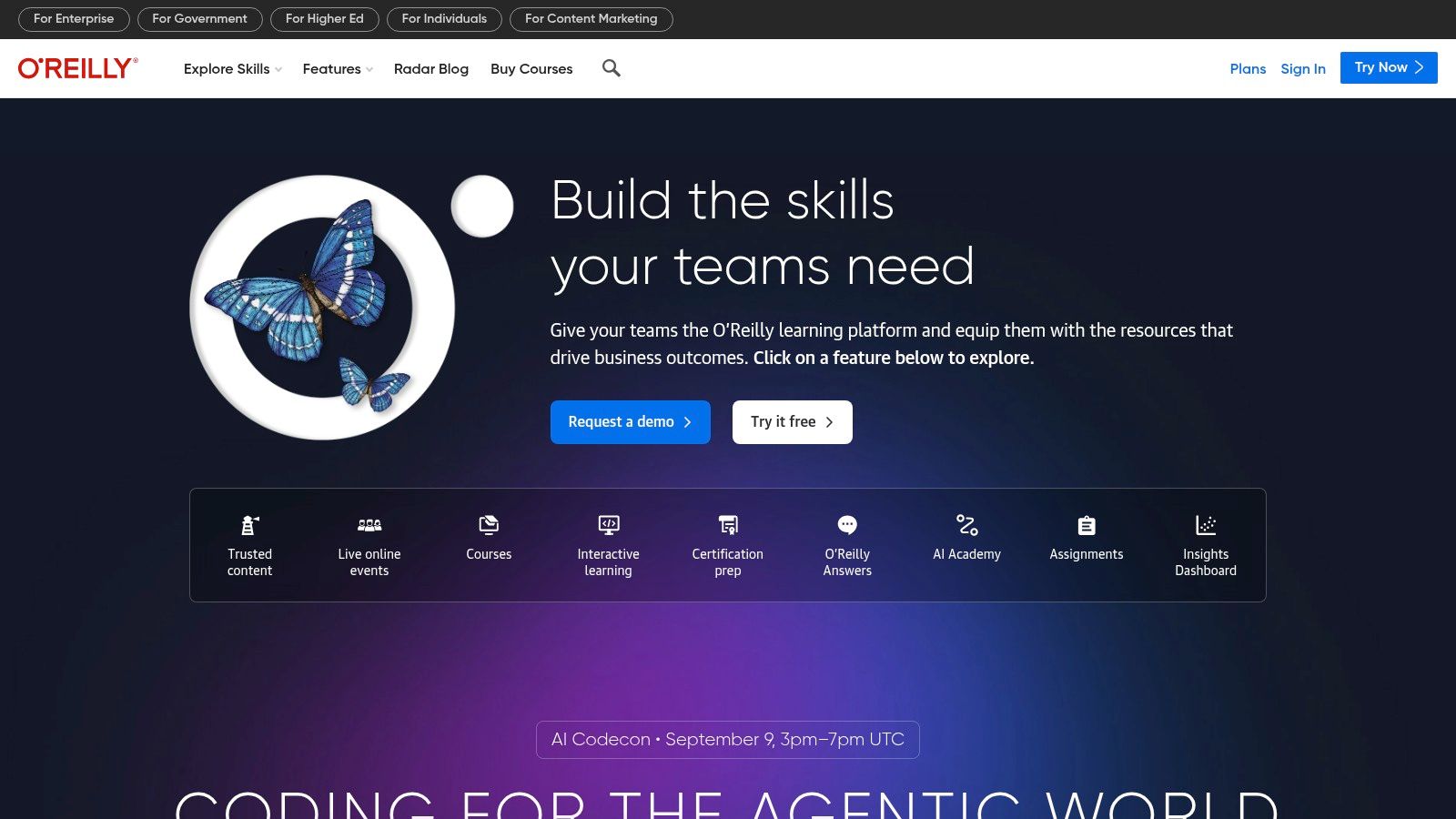
The platform is designed to support continuous learning, allowing users to move from theoretical knowledge to practical application seamlessly. Instead of just reading about an MVP, a user can immediately dive into a hands-on lab or a curated learning path to build relevant skills. This integrated approach, which combines reading with interactive sandboxes, sets it apart from traditional e-book services and makes complex concepts more digestible and actionable for entrepreneurs and product teams.
Key Offerings and User Experience
The user experience on O’Reilly is clean and focused on discovery, with powerful search tools and personalised recommendations. Its mobile apps offer offline reading, making it convenient for learning on the go. The platform is especially useful for teams, providing a centralised hub for upskilling.
- Core Features: An extensive digital library of books and videos, live online training sessions, curated learning paths, and interactive labs/sandboxes.
- Unique Selling Point: The sheer breadth and quality of its curated content under a single subscription, providing instant access to cutting-edge resources on product development and innovation.
- Pricing and Access: Access is through a monthly or annual subscription. Individual plans are available, as are team and enterprise packages which offer more advanced analytics and management features.
Strategic Takeaways
O’Reilly demonstrates how a content platform can serve as an MVP educational tool. Its value proposition is built on providing comprehensive, high-quality, and up-to-date knowledge that empowers builders to create their own successful products.
Pros:
- One subscription unlocks a massive library of MVP-related content.
- Strong curation ensures resources are reliable and current.
- Excellent for individuals or teams needing broad, continuous learning access.
Cons:
- The subscription cost may be higher than buying a few individual books.
- Some popular titles may be rotated out of the library periodically.
4. Coursera (including Coursera Plus)
Coursera is a global online learning platform that offers a vast catalogue of courses, certifications, and degrees from top universities and companies. While not a direct MVP tool, it serves as an essential educational resource for founders and product managers seeking to master the theory and practical application of building successful MVPs. It provides structured learning paths where users can dive deep into real-world minimum viable product examples and complete hands-on assignments.
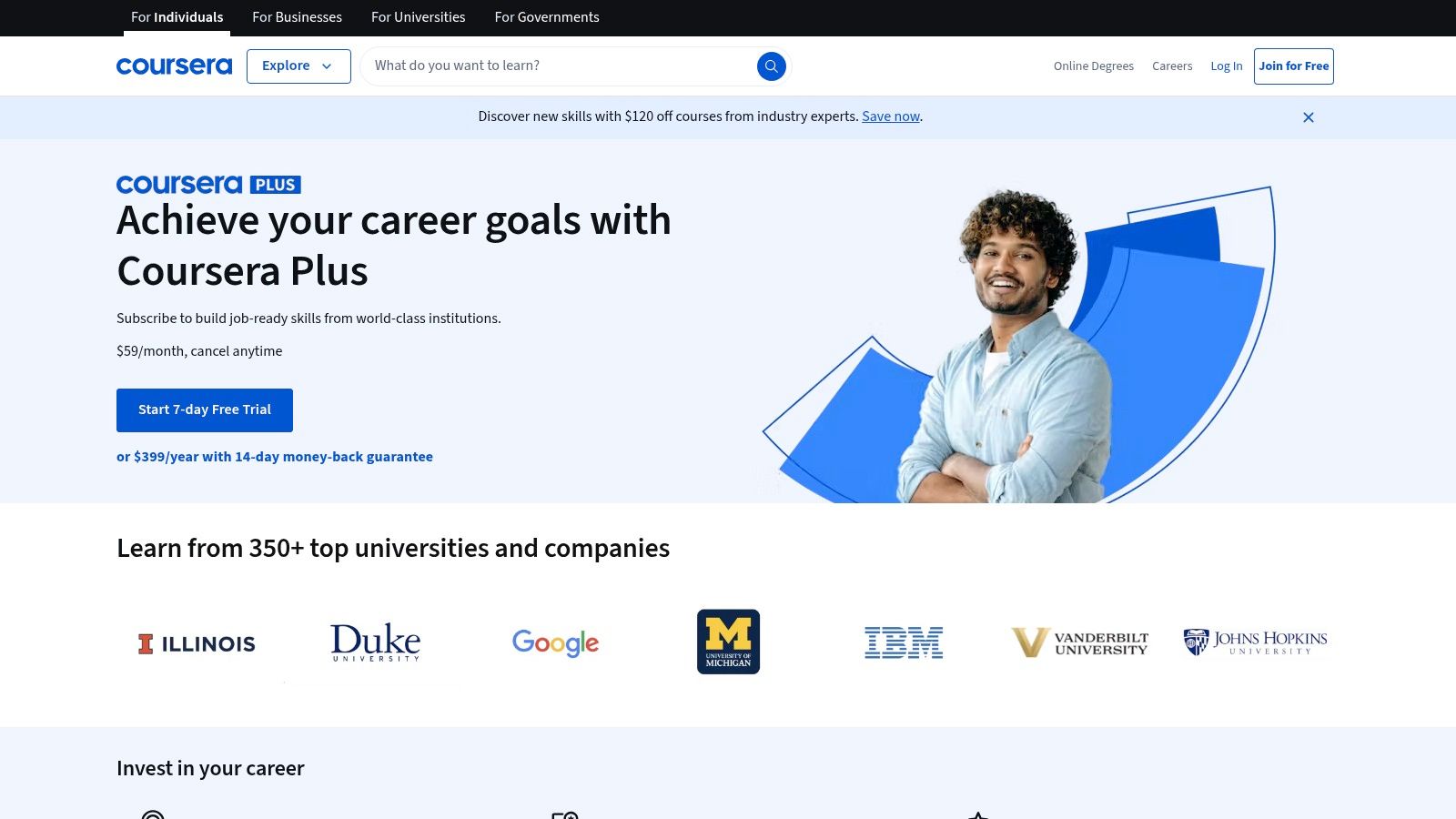
The platform stands out by offering accredited programmes that include graded projects, such as developing a product hypothesis, creating a test plan, or even building a concierge MVP. This applied learning approach helps internalise the core principles of lean startup methodology. Through product management and entrepreneurship specialisations, learners gain the skills needed to validate their ideas systematically, making it an invaluable resource for anyone preparing to launch a new venture.
Key Offerings and User Experience
Coursera’s user experience is built around a guided, academic structure with video lectures, readings, quizzes, and peer-reviewed assignments. The platform is designed for professional development, with clear progression and recognised certificates.
- Core Features: Access to over 10,000 courses with a Coursera Plus subscription, official certificates upon completion, and content from more than 350 prestigious partners.
- Unique Selling Point: Its well-structured curricula offer a university-level educational experience, providing both theoretical knowledge and practical, graded projects relevant to MVP development.
- Pricing and Access: Coursera Plus, offering unlimited access to a majority of the catalogue, is available via a subscription model with a 7-day free trial. Individual courses can also be purchased separately, with frequent promotions often tailored to UK learners.
Strategic Takeaways
Coursera’s value lies in its ability to democratise high-quality education on product development and innovation. It proves that an MVP's success is often determined by the founder's understanding of core principles, making education a critical precursor to execution.
Pros:
- Well-structured curricula with practical, graded projects.
- Recognised certificates from top institutions are useful for career signalling.
- Frequent promotions and a comprehensive Plus subscription offer good value.
Cons:
- Some professional certificates and most degrees are excluded from the Plus subscription.
- The quality and depth of content can vary significantly between courses.
5. Udemy
While not a direct MVP itself, Udemy is an essential marketplace for learning how to build one. The platform hosts thousands of practical, on-demand courses covering every aspect of product development, from initial validation to advanced prototyping. For entrepreneurs and product managers, it offers a fast, affordable way to acquire specific skills needed to launch and test a business idea without a huge upfront educational investment. Many courses feature step-by-step case studies and downloadable project files, making it an invaluable resource for practical application.
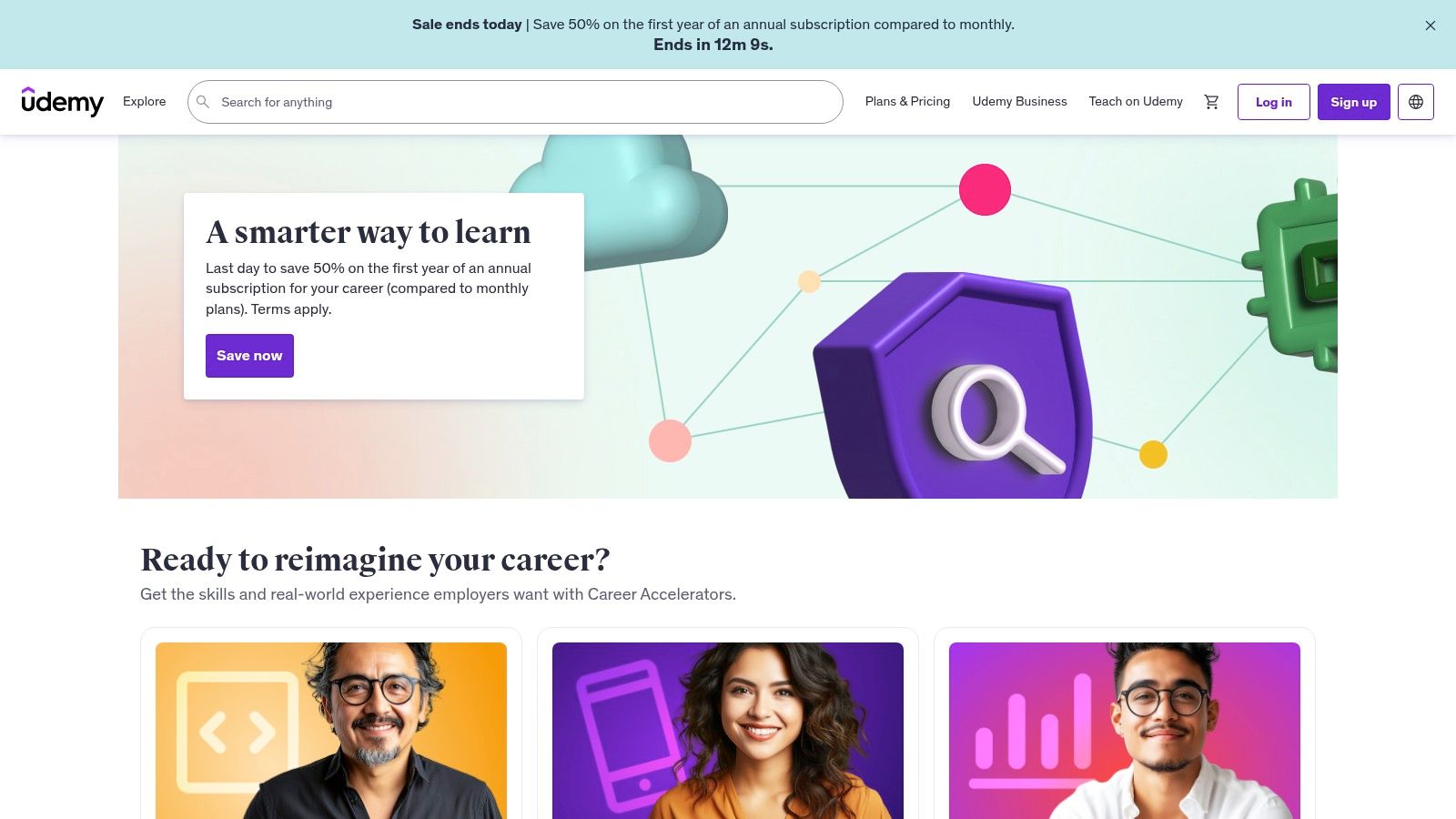
Udemy’s strength lies in its sheer volume and specificity. Instead of a broad curriculum, you can find a course on a niche topic like "Lean Startup: Build a Minimum Viable Product" or "User Story Mapping." This granular approach allows learners to target their exact knowledge gaps. This focus on practical, test-driven development makes it a vital tool for anyone looking to build minimum viable product examples efficiently. To further hone your skills, you can explore some of the top courses for testing software to boost your skills.
Key Offerings and User Experience
Udemy's user experience is straightforward, centred on its course marketplace and video player. The platform's review and rating system is crucial for navigating the variable quality of courses, allowing users to make informed decisions before purchasing.
- Core Features: Lifetime access to purchased video courses, downloadable resources and project files, and a Q&A section for instructor support.
- Unique Selling Point: The incredible breadth of highly tactical and niche topics available at very low prices during frequent sales events.
- Pricing and Access: Individual courses are frequently on sale in the UK for £15-£30. An optional Personal Plan subscription provides access to a curated catalogue of top-rated courses for a monthly fee.
Strategic Takeaways
Udemy demonstrates the power of a marketplace MVP focused on education. By creating a platform for experts to share knowledge, it solved the problem of accessible, affordable, and highly specific skill development for a global audience.
Pros:
- Extremely affordable during frequent sales, with a 30-day refund policy.
- Massive variety of courses covering niche aspects of MVP development.
- Lifetime access encourages learning at your own pace.
Cons:
- Course quality is inconsistent; relies heavily on user reviews for validation.
- The best courses are not always included in the Personal Plan subscription.
6. Mind the Product
Mind the Product is a community-driven platform that serves as a rich resource for product managers seeking real-world knowledge. Rather than a single product, it is a global hub offering articles, talks, and workshops filled with genuine minimum viable product examples from practitioners. It focuses on peer-to-peer learning and hands-on training, with a strong emphasis on MVP approaches from successful UK and EU companies.
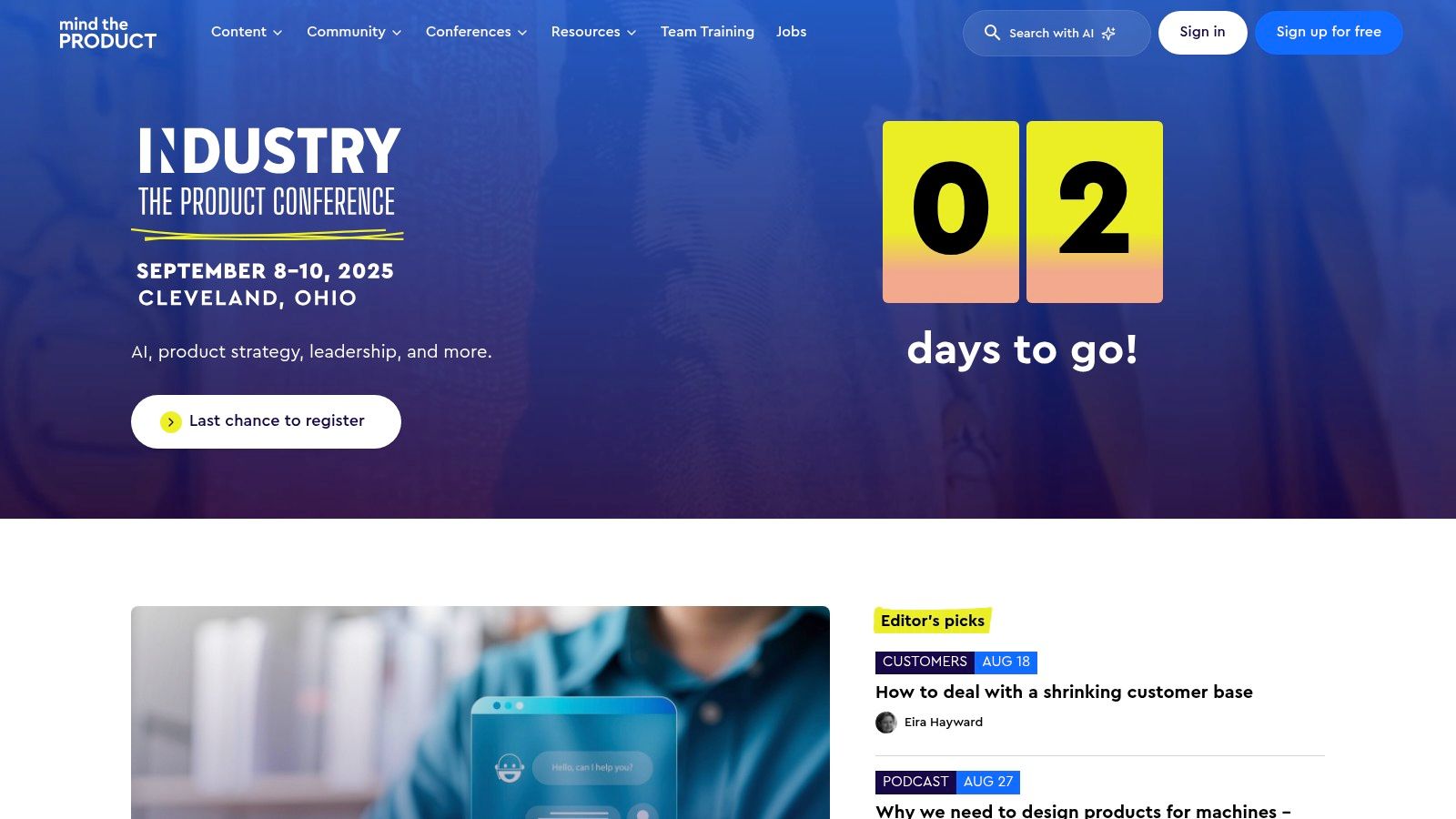
The platform connects product people through its editorial content, local ProductTank meetups, and international conferences. Its value lies in the shared experiences of its members, offering practical insights that go beyond theoretical frameworks. This approach allows members to learn directly from the successes and failures of others, providing a grounded education on how to build and iterate on products effectively. For companies looking to build their own MVPs, understanding modern development is key, and Flutter has emerged as a top-performing framework for cross-platform app development.
Key Offerings and User Experience
The Mind the Product experience is centred around community and accessibility. Free articles and local meetups provide a low-barrier entry point, while premium memberships unlock more in-depth content and training. The user interface is clean, prioritising content discovery and event registration.
- Core Features: A library of free editorial content, global ProductTank meetups, premium memberships, in-depth workshops, and major conferences in London and other cities.
- Unique Selling Point: Its strong UK and European community roots, providing networking opportunities and practical content led by active product leaders.
- Pricing and Access: Access to articles and meetups is free. Premium membership, which includes exclusive content and training discounts, requires a paid subscription. Conference and workshop tickets are sold separately and can be a significant investment.
Strategic Takeaways
Mind the Product demonstrates that a powerful MVP can be a community platform that solves the problem of professional isolation and knowledge sharing. By cultivating a strong network and curating practitioner-led content, it has become an indispensable resource for product managers worldwide.
Pros:
- Strong UK community roots with regular in-person and virtual events.
- Practical, practitioner-led content and "Ask Me Anything" (AMA) sessions.
- Excellent networking with product leaders who share real MVP experiences.
Cons:
- Detailed workshops and premium content are behind a paywall.
- Event and conference tickets can be pricey for individuals without a learning and development budget.
7. Product Hunt
Product Hunt isn't a single MVP but a living library of them. It is a discovery platform where makers launch new products daily, giving entrepreneurs a front-row seat to observe real-world MVP launches in real time. Users can study everything from landing page copy and feature sets to initial user feedback and maker Q&As, offering a practical, ongoing education in product strategy and execution. The platform is a goldmine for anyone looking to understand what resonates with early adopters.
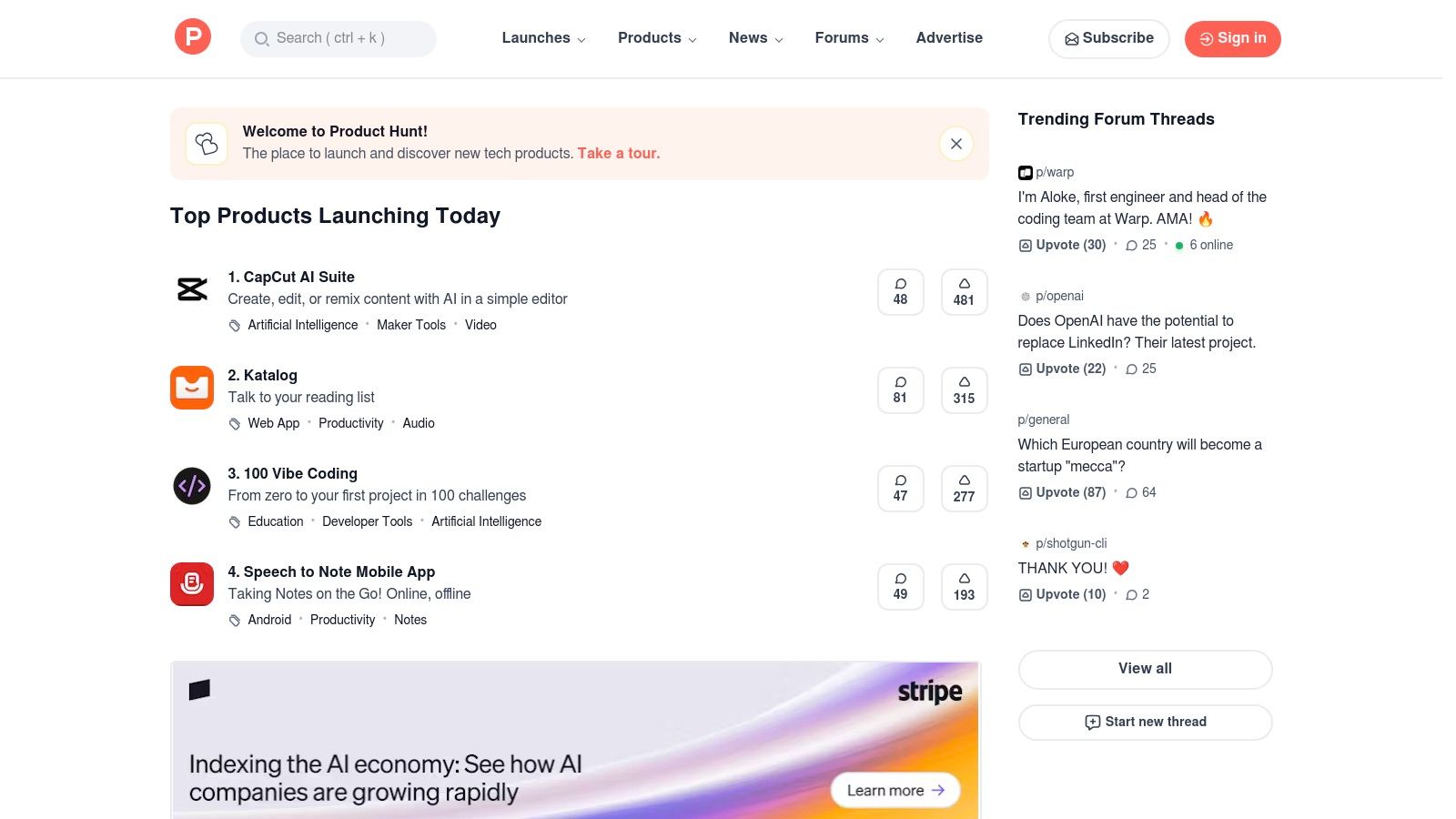
The core value of Product Hunt for aspiring founders is its raw, unfiltered nature. Instead of reading polished case studies, you witness the launch day hustle. This direct access to the source provides invaluable qualitative data on how to position a product, handle initial criticism, and build a community from day one. By analysing both successful and unsuccessful launches, you can gather countless minimum viable product examples to inform your own development journey and avoid common pitfalls.
Key Offerings and User Experience
Product Hunt's user experience is built around daily discovery, with a clean interface that spotlights the day's top new products. The community-driven discussion is a key feature, allowing for direct interaction with the creators.
- Core Features: Daily product listings with upvotes and comments, maker Q&As, curated collections for organising examples, and a powerful search function to find products by category.
- Unique Selling Point: It provides a real-time, continuous stream of MVP launches, offering direct insight into current market trends and user expectations.
- Pricing and Access: The platform is completely free to browse, sign up, and participate in discussions.
Strategic Takeaways
The strategic lesson from Product Hunt is the power of community and transparency in the MVP phase. It demonstrates that a successful launch isn't just about the product itself but also about the story, the engagement, and the ability to listen and iterate based on immediate feedback.
Pros:
- Direct insight into countless real-world MVP launches and iterations.
- Free to access with a highly active and engaged community.
- Easy to create personal collections to bookmark and analyse MVP examples.
Cons:
- Lacks a formal curriculum; the quality and relevance of examples can vary widely.
- Older collections and products can become outdated without active curation.
Minimum Viable Product Examples Comparison
| Platform | Implementation Complexity 🔄 | Resource Requirements ⚡ | Expected Outcomes 📊 | Ideal Use Cases 💡 | Key Advantages ⭐ |
|---|---|---|---|---|---|
| Strategyzer | Medium - structured courses with guided playbooks | Moderate - premium pricing, specific bundles | High - de-risk ideas quickly using real MVP experiments | Teams needing clear MVP testing frameworks | Practitioner-led, real examples, clear playbooks |
| LEANSTACK / LEANFoundry | Medium-High - hands-on, guided playbooks | Moderate-High - coaching clinics, tiered access | High - move from idea to paying customers in ~90 days | Founders/teams wanting practical MVP validation | Learn-by-doing, extensive tools, coaching options |
| O’Reilly Learning | Low - subscription access to broad content | Moderate - subscription cost | Medium-High - broad MVP resources, up-to-date | Individuals/teams needing broad learning access | Large curated content library, multiple formats |
| Coursera (incl. Plus) | Medium - structured university-level courses | Moderate - subscription or course fees | Medium-High - certificates and graded projects | Career advancement, formal certification | Recognised certificates, well-structured curricula |
| Udemy | Low - self-paced, diverse course quality | Low - affordable courses, frequent sales | Medium - practical skills and MVP tutorials | Quick, affordable MVP learning or refreshers | Cost-effective, large topic variety, lifetime access |
| Mind the Product | Medium - workshops and community engagement | Moderate - membership and event tickets | Medium - hands-on training, UK/EU market insights | Product managers seeking community and events | Strong UK community, practitioner-led content |
| Product Hunt | Low - informal, daily updated MVP examples | Low - free sign-up | Variable - real MVP examples and user feedback | Researching live MVP launches and market trends | Free, real product insights, active user discussions |
Your Next Step: Building a High-Performance MVP with Flutter
As we've explored through these diverse minimum viable product examples, from Product Hunt's simple email list to the focused educational platforms of Udemy and Coursera, a powerful pattern emerges. Success isn't about building a feature-rich product from day one; it’s about strategically validating a core assumption with the least amount of effort. Each example demonstrates a commitment to the fundamental build-measure-learn feedback loop.
These organisations prioritised learning over building. They identified the riskiest part of their business model and designed a simple, focused experiment to test it directly with their target audience. This approach minimises wasted resources and ensures the final product is built on a foundation of proven customer demand.
From Insights to Action: Your MVP Blueprint
The primary takeaway from these case studies is the importance of focus. Your initial goal is not to build a complete product, but to answer a critical question: "Do people want what I'm offering?" To get this answer quickly and efficiently, you must ruthlessly prioritise your features down to the single, most crucial element that delivers value.
Here are the key lessons to guide your own MVP development:
- Isolate the Core Hypothesis: Just as LEANSTACK isolates and tests assumptions, pinpoint the single most important belief that must be true for your business to succeed. Your MVP's sole purpose is to validate or invalidate this hypothesis.
- Embrace Manual Processes: Don't be afraid to do things that don't scale initially. A 'concierge' or 'Wizard of Oz' MVP, where you manually perform tasks on the back end, can be the fastest way to test your value proposition without writing a single line of complex code.
- Measure What Matters: Define your success metric before you launch. Whether it's sign-ups, pre-orders, or active engagement, having a clear key performance indicator (KPI) is essential for objectively assessing your MVP's performance.
Choosing the Right Technology: Accelerate Your Learning with Flutter
When you're ready to build a functional, technology-based MVP, your choice of development framework is critical. For startups and businesses aiming to test a mobile app concept, the goal is to get a high-quality product into the hands of real users on both iOS and Android as quickly as possible. This is where Flutter offers a decisive advantage.
As a leading Flutter app developer in the UK, we've seen how its single codebase dramatically accelerates the development lifecycle. Instead of building and maintaining two separate native apps, you build once and deploy everywhere. Recent benchmarks confirm that Flutter consistently delivers top-tier, natively-compiled performance, ensuring your MVP provides a smooth and professional user experience that doesn't feel like a compromise. This speed and efficiency are not just technical benefits; they are strategic assets, enabling you to iterate faster, respond to user feedback quicker, and ultimately, find your product-market fit with less capital.
The journey from an idea to a thriving product begins with a single, focused step. The minimum viable product examples in this article prove that a lean, learning-oriented approach is the surest path to success. By combining a disciplined strategy with a powerful development tool like Flutter, you can transform your vision into a tangible, high-performance application that sets the stage for future growth.
Ready to turn your concept into a reality? At App Developer UK, we specialise in crafting high-performance MVPs using Flutter, helping you validate your idea and get to market faster. Partner with our expert team to build an application that is not only viable but truly exceptional. Visit App Developer UK to start your project today.